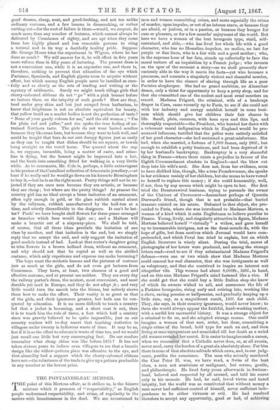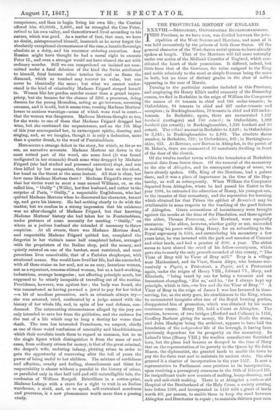THE FONTAINEBLEAU MURDER.
THE point of this Mertens affair, as it strikes us, is the bizarre mixture which it presents of "respectability," as English people understand respectability, and crime, of regularity in the motive with licentiousness in the deed. We are accustomed to
men and women committing crime, and more especially the crime of murder, upon impulse, or out of an intense crave, or because they are afraid, or jealous, or in a passion, or because they hunger for ease or pleasure, or for a few months' enjoyment of the world. But here we have a woman of the best bourgeois type, staid, self- restrained, and able,—who has lived her whole life with a good character, who has no Messalina impulses, no malice, no lust for purple or fine linen, who is a fair wife and a good mother ; who, in the supreme hour of her fate, stands up collectedly to face the moral torture of an inquisition by a French judge ; who invents on the spur of the moment a story—as we shall presently show curiously able in the way it meets the facts—yet who becomes a procuress, and commits a singularly violent and shameful murder, in order to have the chance of slaving through life as a poor Parisian shopkeeper. She had no grand ambition, no Alnaschar dream, only a thirst for opportunity to keep a petty shop, and for that she committed one of the coolest and most cruel murders on record. Madame Frigard, the criminal, wife of a bankrupt draper in Caen, came recently up to Paris, to see if she could not with her industry and energy establish herself in some busi- ness which should give her children their fair chance in life. Small, plain, common, with keen eyes and thin lips, and thoroughly respectable—the President, who hunted her down with a vehement moral indignation which in England would be pro- nounced infamous, testified that the police were entirely satisfied of her good character—she had sustained a great misfortune. She had, when she married, a fortune of 7,000 francs, only 280/., but enough to establish a petty business, and had been deprived of it by her husband's bankruptcy. Bankruptcy is a very shameful thing in France—where there exists a prejudice in favour of the Eighth Commandment obsolete in England—and the blow cut deep into his wife's soul. She does not, from her evidence, seem to have disliked him, though, like a true Frenchwoman, she speaks in her evidence mainly of her children, but she seems to have vowed to herself to replace this money ; if she could honourably, well, if not, then by any means which might be open to her. She first tried the Dousterswivel business, trying to persuade the owner of the Château of Crevecceur—descendant perhaps of Quentin Durward's friend, though that is not probable—that buried treasure existed on his estate. Defeated in that object, she pro- ceeded to Paris, where she was introduced to Madame Mertens, a woman of a kind which it suits Englishmen to believe peculiar to France. Young, lively, and singularly attractive in figure, Madame Mertens believed herself " virtually " a widow, and gave herself up to innumerable intrigues, not as the demi-monde do, with the hope of gifts, but from motives which Juvenal would have com- prehended, and which Feval has tried to explain, but on which English literature is wisely silent. During the trial, scores of photographs of her lovers were produced, and among the strange letters read—read to see if they substantiated Madame Frigard's defence—were one or two which show that Madame Mertens could conceal her real character, that she was intriguante as well as voluptuary, and that she contrived to inspire an interest not altogether vile. 'Thie woman had about 8,000fr., 3201., in hand, and on this sum Madame Frigard's mind fastened like a vice. If she could get that she could buy a little Italian shop she knew of which its owners wished to sell, and commence the life of a Parisian bourgeoise, rising early and retiring late, working like a slave, saving pennies or halfpennies, and gradually heaping up a little sum, say, as a magnificent result, 150/. for each child. They, she says, in their country ignorance, would never know ; to them she would always appear the faithful, hard-working mother, with a sordid but aueventful history. It was a strange object for a criminal to fix on, and she adopted strange means. One could imagine a woman of that sort, strict, but dour, committing a single crime of the broad, bold type for such an end, and then living at once unrepentant and unsatisfied till her death as a weird old woman revealed her secret. It is easier to imagine such a career, when we remember that a Catholic never does, or, at all events, never need, carry the burden of a great sin absolutely alone. For him there is none of that absolute solitude which cows, and, incur judg- ment, purifies the conscience. The man who actually murdered the Czar Peter II. was, we have read, a Swiss of the best class, a man not avaricious or malignant, but serene, gentle, and philanthropic. He lived forty years afterwards in Switzer- land, beloved and respected by all around, and told his secret only in his memoir. He had, he said, loved virtue and hated iniquity, but the world was so constituted that without money a man never had sufficient control of himself, never sufficient inde- pendence to be either virtuous or evil. He had resolved therefore to accept any opportunity, good or bad, of achieving competence, and then to begin living his own life ; the Czarina offered him 60,000fr., 2,400/., and he strangled the Czar Peter, retired to his own valley, and thenceforward liyed according to his nature, which was good. As a matter of fact, that man, we have no doubt, misrepresented himself, inasmuch as he never forgot the absolutely exceptional circumstances of the case, a lunatic Sovereign absolute as a deity, and his successor ordering execution. Any Russian might have thought he had a moral right to execute Peter IL, and even a stranger would not have classed the act with ordinary- murder. Still we can comprehend an isolated act com- mitted under a fatal delusion of the kind the Swiss attributed to himself, fatal because crime touches the soul as flame the .diamond, which so touched may recover its value, but can never be identically the same ; but what we cannot under- stand is the kind of criminality Madame Frigard steeped herself in. Women like her pardon murder sooner than a grand impro- priety, bat she became for the chance of 3201. a procuress, doing 4Iaenna for the young Messalina, acting as go-between, screening -excesses, and it is odd, but it seems true, rousing Madame Mertens' lovers to anxious warnings—some of which were read in court— that the woman was dangerous. Madame Mertens thought so too, lor she wrote to one of them that Madame Frigard drugged her wine, but she continued the acquaintance, and on the 7th May of this year accompanied her, in extravagant spirits, dancing and tlnging, and, as we imagine, though it is only a deduction, more than a quarter drunk, to the wood of Fontainebleau.
Here occurs a strange defect in the story, for which, as far as we see, no narrative accounts. Madame Mertens sat down in the most retired part of the wood, ate some food (it was found undigested in her stomach) drank some wine drugged by Madame Erigard (she had studied and possessed narcotics) slept, and was then killed by her companion, throwing her knee on the chest, her hand on the throat at the same instant. All that is clear, but low came Madame Mertens there ? Madame Frigard's story was that her victim went to meet a man named Williams, or, as she -called han, " Ouilly " (Willie), her first husband, and rather to the :surprise of Paris, " Ouilly," a respectable Englishman, who had quitted Madame Mertens when he discovered her character, turned -up, and gave his history. He had nothing clearly to do with the matter, but we confess to a strong impression that his existence was no after-thought of Madame Frigard, but that knowing .Madame Mertens' history she had taken her to Fontainebleau, -under pretence of some necessity for meeting " Ouilly," on whom as a jealous husband she intended if necessary to throw zuspicion. At all events, there was Madame Mertens dead, and respectable Madame Frigard quitted her, completed the lorgeries in her victim's name half completed before, arranged -with the proprietors of the Italian shop, paid the money, and -quietly entered on one of the hardest, most restricted, and moat penurious lives conceivable, that of a Parisian shopkeeper, with straitened means. She would have lived her life, had she succeeded, with all these stains on her soul, not as an easy, luxurious woman, not as a repentant, remorse-stirred woman, but as a hard-working, 'industrious, average bourgeoise ; not affecting principle much, but .supposed to be utterly incapable of travelling out of the routine. Providence, however, was against her ; the body was found, she -was remembered as having pawned a jewel to pay for her ticket —a bit of needless precaution, such as criminals always try— .she was arrested, tried, confronted by a judge armed with the history of her whole life, and, in spite of her cool defence, con- -deraned. The extenuating circumstances alleged by the jury are only intended to save her from the guillotine, and she endures for .the rest of a life which may be long a destiny far worse than death. The case has interested Frenchmen, we suspect, chiefly as one of those weird confusions of sensuality and bloodthirstiness which their novelists teach them to regard as common, but to us the single figure which distinguishes it from the mass of such cases, from ordinary crimes for money, is that of the great criminal, the draper's wife, enduring infamy, plotting crime in order to gain the opportunity of recovering after the toil of years the -power of being useful to her children. The mixture of sordidness and affeetion, cruelty and feeling, shamelessness and thirst for respectability is almost without a parallel in the history of crime, or paralleled only in that half told and still unintelligible tale, the confession of William Roupell. Brinvilliers in a cotton-print, Madame Lafarge with a crave for a right to wait in an Italian warehouse, a staid, and, so to speak, self-restrained murderess and procuress, is a new phenomenon worth more than a passing study.































 Previous page
Previous page